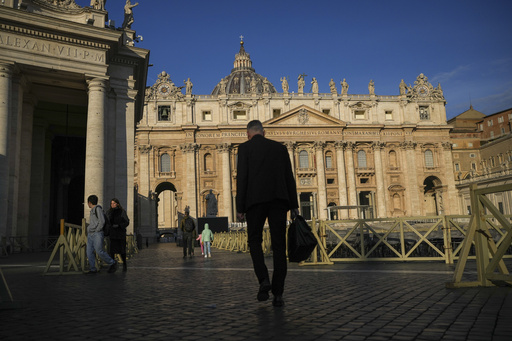VATICAN CITY — The Vatican is governed by strict laws and rituals designed to manage power transfers following the death or resignation of a pope. However, there are no established procedures to handle situations where a pope is critically ill or unconscious, leaving a significant gap regarding the leadership of the Catholic Church in case of severe incapacity. Despite Pope Francis being hospitalized with a serious lung infection, he remains in command, continuing his papal role.
Pope Francis’s current health crisis has prompted discussions about what would occur if he were to become unconscious for an extended time or if he might choose to resign, following the example set by Pope Benedict XVI. This week marks ten days in the hospital for Francis, matching his stay in 2021 for colon surgery where a significant portion was removed. Concerns about papal authority and governance in the Holy See are heightened due to Francis’s age and ongoing health issues, leading to questions regarding the lack of regulatory frameworks concerning a pope’s incapacity to lead.
Currently, though Pope Francis is hospitalized, he delegates daily responsibilities to a group of officials overseeing the Vatican’s operations, which continue uninterrupted. Leading this effort is Cardinal Pietro Parolin, the Secretary of State, while planning for significant events like the 2025 Holy Year celebrations is also on track.
While canon law includes provisions for bishops who are unwell and unable to manage their dioceses, similar rules for a pope do not exist. Canon 412 allows the leadership of a diocese to be transferred in cases of serious incapacity, yet there are no corresponding measures when the pope, as the Bishop of Rome, faces similar challenges. Canon 335 indicates that nothing can be altered regarding church governance when the Holy See is “vacant or entirely impeded,” but fails to elaborate on what this implicates or the necessary protocols in such an event.
In an effort to address these legislative shortcomings, canon lawyers initiated a process in 2021 aimed at proposing new regulations to govern the situation of an incapacitated pope, whether temporarily or permanently. Their proposals stress the potential for a future where a pope may be alive but unable to fulfill his duties, necessitating the establishment of a “totally impeded see” alongside guidelines for power transfer for church unity.
The proposed guidelines suggest that governance should shift to the College of Cardinals during a pope’s temporary incapacity, with a commission created to oversee matters, supplemented by regular medical assessments every six months to track the pope’s health. Initially met with skepticism due to the sensitivity of the topic, these proposals have gained traction, with even Pope Francis’s own legal advisor emphasizing the importance of having established norms if a pope became incapable of ruling.
Complicating matters, Pope Francis has revealed that he penned a resignation letter shortly after becoming pope, intended for use if he were to become unable to function due to health issues. He entrusted this letter to Cardinal Tarcisio Bertone, believing it likely made its way to Cardinal Parolin’s office after Bertone’s retirement. The specifics of the letter remain undisclosed, raising questions about its canonical legitimacy since the law demands that a resignation must be “freely and properly manifested.”
Historical cases also exist, such as one involving Pope Paul VI, who had written to the College of Cardinals about resigning in the event of serious illness, although he never needed to act on this letter, serving in his role for an additional 13 years.
The transition of papal authority traditionally occurs exclusively upon the death or resignation of a pope. This process involves a series of ceremonies known as the “interregnum,” wherein the camerlengo manages the Holy See’s administration and finances, certifying the pope’s death and preparing for the subsequent conclave to elect a new leader. Currently, Cardinal Kevin Farrell holds the camerlengo position. However, this office does not function during a pope’s illness or incapacity, nor does the dean of the College of Cardinals, who provides oversight during a papal funeral and conclave.
A noteworthy decision made by Francis was to retain the current dean of the College of Cardinals, Cardinal Giovanni Battista Re, despite the expiration of his term. Additionally, the vice-dean, Cardinal Leonardo Sandri, will also continue in his role.




